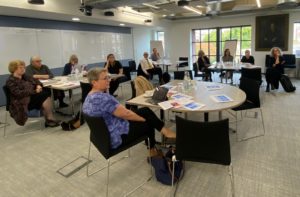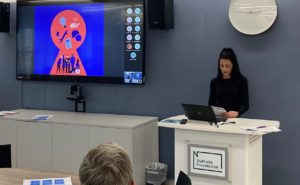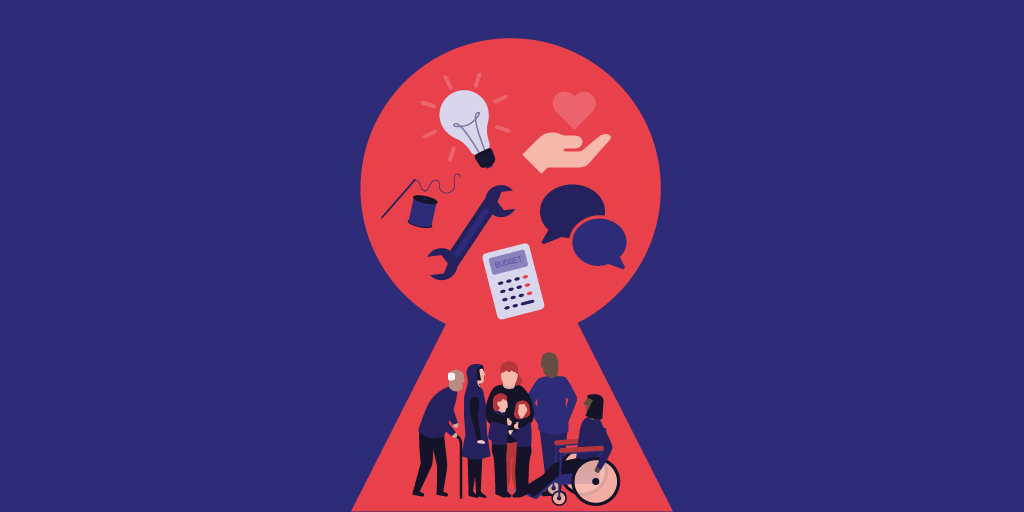Poverty-Aware Practice and the Psychological Impact of Poverty
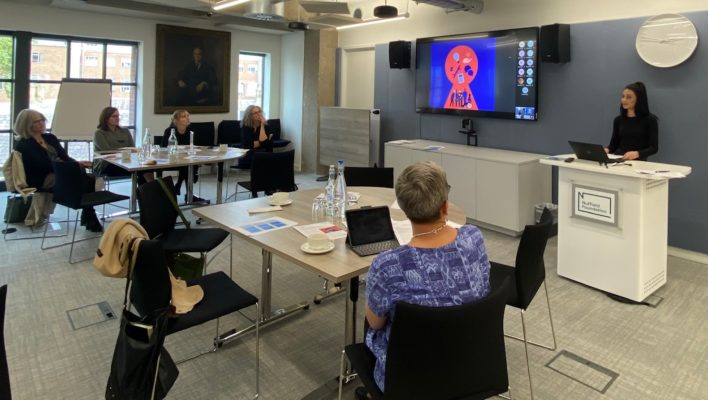
On 3 October 2022, the Nuffield Family Justice Observatory invited Francesca Crozier-Roche and Diana Skelton to speak to its Stakeholder Advisory Council about the need for poverty-aware practice in the family justice system. Their remarks are below.
Francesca: Today, we’re going to talk about:
- what poverty looked like before the cost-of-living crunch
- the psychological impact of poverty
- and how practitioners should change their practice
1. Before the cost-of-living crunch
I find it shocking that all of a sudden people are acting like poverty is new. This happened during the austerity crisis too. It happens every ten years or so, there’s a cycle of crises. But poverty has never gone away, even when there’s no crisis. Professionals should have been concerned about poverty before this crisis started.
Diana: We’re going to tell you about a piece of participatory research done by ATD Fourth World in 2016-19 on “Understanding Poverty in All Its Forms”. Some of the co-researchers were people who’ve been in deep poverty all their lives and struggled with their GCSEs, while we also had co-researchers from Oxford University. It was a big challenge for those from Oxford to understand that the collaboration extended to every last comma in the final report but in the end it was completely co-produced. The findings are about six dimensions of poverty, which are encapsulated in six images:
Disempowering systems, structures and policies
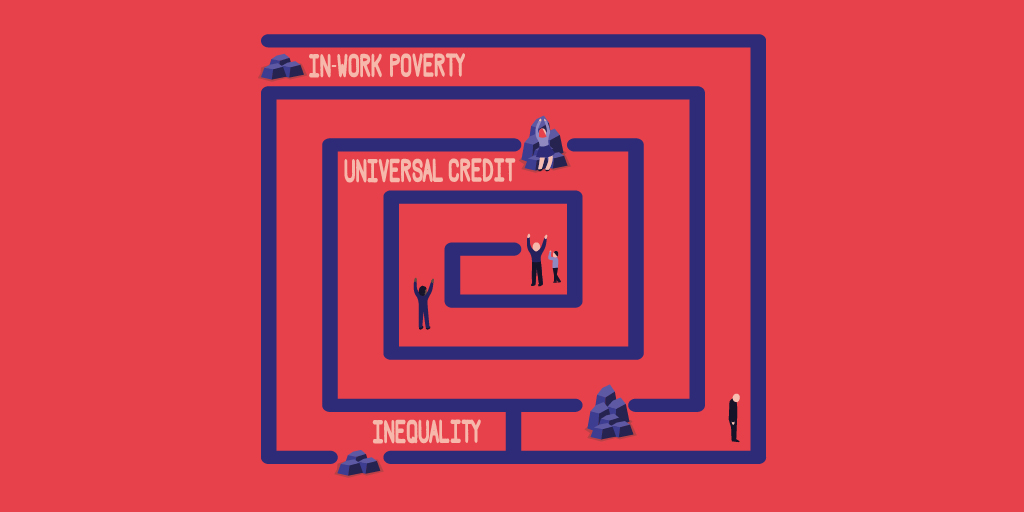
“Poverty means being part of a system that leaves you waiting indefinitely in a state of fear and uncertainty.”
“In the system, you are a number instead of a person. You are dehumanised.”
Financial Insecurity, financial exclusion, and debt
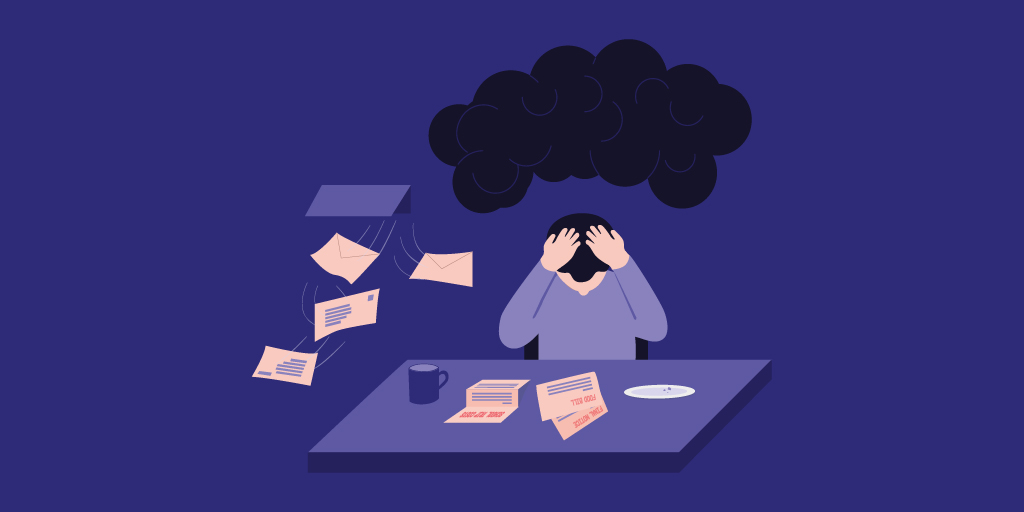
“Poverty means working for a pittance, doing 10-hour shifts, for 10-day runs and still not getting out of the black hole of debt.”
“Poverty feels like you’re on the outside looking in – you cannot afford to take part.”
“If you are starving, it is difficult to think about anything else.”
“Poverty is worrying about money all of the time.”
“You dread having your children wake up with no heat just like you hated doing as a child.”
Damaged health and well-being
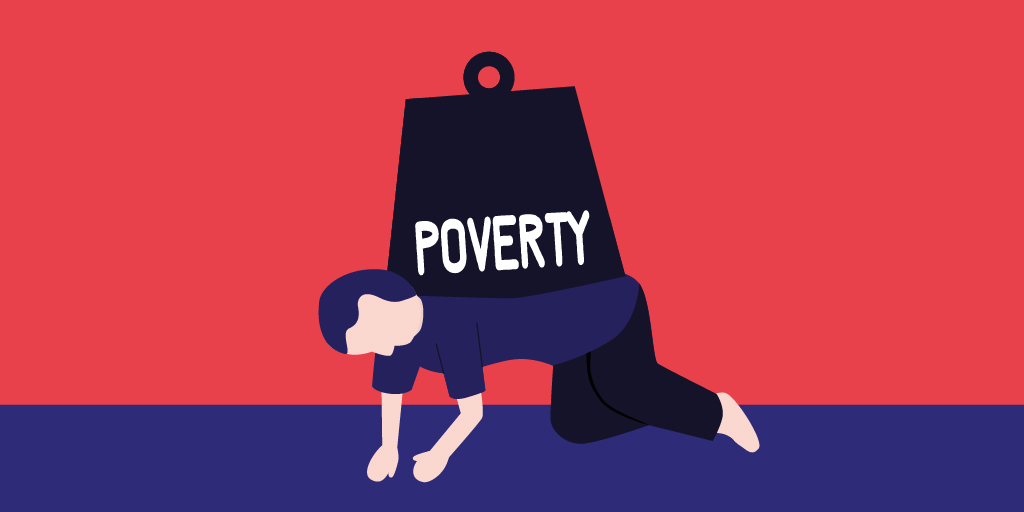
“Poverty is not being able to smell the flowers because the stress of life gets in the way.”
“Poverty makes you feel lost in the fog, not knowing if you are disconnected or cast adrift.”
“Poverty shortens lives.”
Stigma, blame and judgement
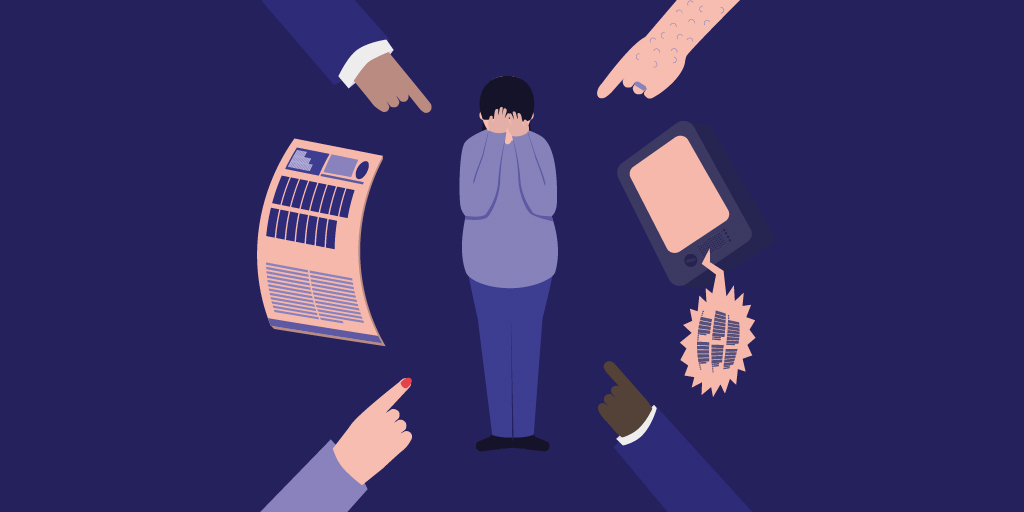
“Poverty is feeling that you are a burden, that you do not contribute to the economy and to society.”
“Poverty means being bullied, bulldozed, being pushed away, and not wanted.”
“Being in poverty makes you feel ashamed.”
Lack of control over choices
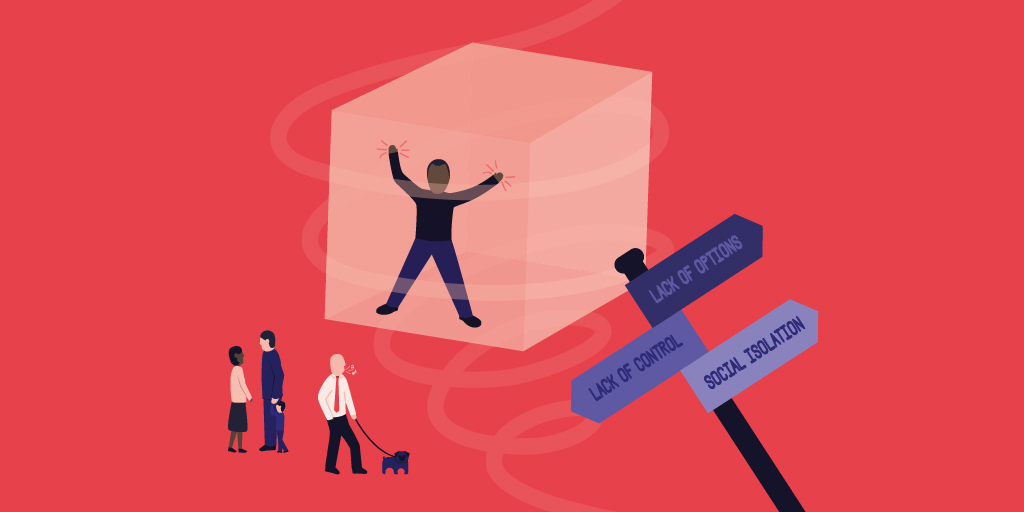
“Poverty means your horizons being hugely restricted because your focus is on survival.”
“Poverty is a dungeon of boredom, staring at the same four walls, chained up in a place where nothing happens.”
“Poverty is a spider’s web, almost impossible to get out of.”
Unrecognised struggles, skills and contributions
“Poverty means having to break down barriers and be resilient.”
“Families in poverty aren’t recognised for the wealth of life skills they have.”
“In poverty, we might sometimes feel broken by experience, but we are generous in spirit, solidarity and community spirit.”
2. Poverty is a constant crisis with a psychological impact
Francesca: In all six of those dimensions, there’s a huge psychological impact of poverty. You’re caught in this revolving cycle where one crisis leads to another crisis.
Being on Universal Credit means another revolving cycle of crisis: even after you qualify for it, there’s a six-week delay before you’re paid. They loan you money to take it back from your benefits later, so you start out in debt. When your employer assigns you extra shifts, that means your Universal Credit will be cut by 55p for every pound you earn, but there’s a time delay so it’s the following month that your benefits are reduced, and if you get fewer shifts then, you’re stuck with almost no income and food grants have been blitzed by the councils.
Or if you’re self-employed, all it takes is for your employer to make a mistake in the tax declaration, and all your benefits get cut off instantly. Even after an employer sees it was their error, all they say is: “We’ll do an internal investigation and get back to you but it will take weeks”. In the meantime, you’ve got no choice, you have to constantly empower yourself to find a way to make things work for your family.
Driven into poverty and debt by the demands of children’s services
A huge proportion of single parents are in poverty because the costs of child care can drive you into debt. If your child is in hospital, you have the extra expenses of food and coffee from vending machines, the television in their room, and the treatments that aren’t covered. And while you’re visiting them in hospital, you miss work or other appointments. If one of your children goes into care, you lose the benefit for that child, which means you can be hit with the bedroom tax and lose your home.
At the same time, you’ve got to pay the transport costs to visit your child and to attend courses that social services have asked you to attend. Of course you’ve still got costs for their birthdays and Christmas—but just getting to the contact centre is often such a long trip that you’re losing hours when you could be working. Your time is taken up by the demands of children’s services to the point where you’re driven into poverty and debt.
And it’s never considered that you would want to go back to family court, because there’s no funding for that at all. If you do somehow manage to get your child back from foster care, you may find that they struggle to manage their behaviour and emotions because they were offered no support during or after their experience so you had better learn how to offer them therapeutic care yourself.
Harsh and triggering assessments
There are parents who grew up being abused and traumatised by the system, sometimes put in unregulated accommodation as 16-year-olds and then being groomed and trafficked while they were in state care. When that person is expecting a child, the fact that they were in state care means that their parenting capacity will be strictly assessed before the child is even born. Nine times out of ten, the assessments are very harsh and very triggering.
Social services will also go through old files to bring up a person’s entire childhood as an argument for a forced adoption of their unborn child. They’ll presume that a woman in a relationship with domestic violence knows what domestic violence is. But if abuse and violence is all a person has ever known, they don’t actually know there are any other kind of relationships.
And sometimes these parents whose childhood was stolen by systemic failure then have to watch their own children removed into care and traumatised by the system.
Rights denied because of poverty
It is because early intervention isn’t there that many parents get classed as neglectful. These are not parents accused of physically or sexually abusing their children. But the minute a child protection case is opened, parents are stigmatised by professionals, by society, and by all audiences. Once you are in the “child protection category”, you can be cast as an abuser. This is how the feelings of hostility arise in parents: parents who have a child protection case become segregated away from the rest of society. Even after their children are returned to their care, most find that coldness is still present in the way parents are treated. So the segregation continues.
Parents need support too. Yet, because they find themselves in poverty, it is like they have forfeited their right to access services. When people are denied a right because of poverty and left to struggle alone, I personally think this is a form of abuse. When you live in poverty, your human rights are denied in ways that do not happen for others.
Everyone deserves to have their voice listened to and taken seriously. Too often, voices coming from a place of poverty are dismissed, they are looked down on. Others always seem to think they know better. When in fact your right to have a voice isn’t respected, this causes great emotional harm to a person and can affect their mental health.
No one was listening
In the most serious cases, this can lead to tragic consequences. In one family I was supporting last year, their 14-year-old daughter who was in the care system took her own life. I would consider the system to have abused her basic human rights by not listening to her. The processes put in place were not respected or followed. All the child was asking is to be listened to, for her feelings and views to be heard — but she was dismissed. No one in the system was listening to her.
When you live in poverty, all your energy is depleted, your mindset is constantly fatigued by this rat race where you’re chasing the same things all the time. You have no resources or freedom!
As a society we are responsible for making sure that the Maslow’s hierarchy of basic human needs are MET. When parents are struggling without decent housing or food, how can they meet their children’s emotional needs? It’s crazy to expect people in poverty to be able to accomplish anything when their needs and their children’s needs are not being met. You must give people a toolbox to create change.
Systemic failure is traumatising. In a country like the UK, for people to have to live like this is absolute B.S.
3. How practitioners should change their practices
Diana: We see parent-to-parent advocacy as a very important tool. Parents who have first-hand experience of the impact of poverty on family life and also of social service investigations have an enormous amount to offer other parents. They can meet parents before a case conference takes place to build a supportive and trusting relationship, to help them keep track of confusing information, to explain the jargon that will be used, and to make a plan about what they want to say in court.
Nikki was a parent-to-parent advocate with a local authority in London. She used to tell parents: “If you want to swear, do it now with me so that you’re not tempted to do it in court.” Once Nikki had supported a couple for several weeks when suddenly her supervisor called and told her not to come to their final court date. He said: “You should stay away because you might experience secondary trauma”.
Nikki knew that meant the couple were losing their children and so she went to court with them anyway and supported them through one of the worst experiences of their lives. But following that, no one from the council so much as checked in with Nikki to see how she was doing, let alone offered her support for her own secondary trauma.
Where is the accountibility?
Francesca: Our systems expect people with lived experience to do all this without support. As an advocate, I’m expected to talk about my own trauma but there’s no funding for a psychotherapist. We’re working inside an oppressive system and we get burnt out.
There’s also the practical side of it. We’re all expected to know how to invoice professionals for our time but some of the institutions that call on us have massively complicated systems that take forever to pay invoices. That’s another drain on our energy when we’re already coping with lots of other challenges. When local councils have funding to involve people with lived experience, they should pass it on to small community groups to let them resource it in a more human way.
There should be more accountability too. One single mother recently received a letter from the Child Maintenance Service about her 17-year-old son for whom the mother had never once received a penny of child maintenance. The letter said CMS had decided to “write off” all the arrears for these missed payments. That’s a total of £20,000 that they’re announcing they never collected. If she had gotten the payments, just think how much easier it would have made things over the years! Why is there no accountability for the agency that was supposed to enforce these payments? And what sense does it make for them to send a letter announcing that they are “writing off” their failure to support a family for 17 years?
Recognition and root causes
Another change that professionals should make is giving positive recognition. For parents in poverty, life is always hectic. I see parents who do make progress but who get almost no recognition for that. One of my values is to offer parents recognition that their needs are not being met. Empowerment is so important to the growth of a human being. Think about it:
If a parent never gave their child positive recognition throughout the process, they would be deemed not emotionally responsible to respond to their child’s emotions. Yet professionals do not seem to recognize the same psychological impacts for the parent.
Some professionals have an outcome in mind for a case conference and they just want it done their way. They never think to check in with the parent to understand the root causes of a situation. In every situation, we need to critical deconstruction to look for the roots.
Accusations based on false assumptions
Diana: Poverty-aware practice definitely means working alongside parents to look for the root cause of a situation. To give an example, a mother in poverty who is part of ATD once found herself in a meeting at her children’s school where every professional in the room accused her of not caring about her daughters’ education because they were often late or absent. Not one professional asked her about her situation. If they had, they would have discovered that her children had both lost their Zip cards (the Oyster cards that allow children free transportation to go to school). Because they didn’t have the Zip cards, they were often thrown off the bus and had to walk the rest of the way to school.
But replacing lost Zip cards is not easy. Applications have to be done online, but this mother didn’t have a computer or email address. The mother also needed to replace the girls’ birth certificates and to get passport-sized photos, none of which she could afford because she was in rent arrears and debt. But after ATD helped the mother to replace the Zip cards, her daughters showed up at school on time every day. Poverty-aware practice would have been for the professionals in school not to assume they knew why the girls were arriving late but to ask the mother so that they could support her.
At ATD Fourth World, we often ask parents in poverty what kind of support they find meaningful. They all agree that it starts with relationships: it means a lot when a professional calls to introduce themselves before making a home visit. Even better is the rare professional who refrains from reading more than the cover sheet on a case file before meeting people for the first time. There are often errors in the files, and even when information is correct, it’s two-dimensional and usually omits anything positive. Once a professional refrained from entering a family’s home and instead invited the parent out for coffee as a better way to introduce herself.
Once a relationship is built, poverty-aware practice means engaging in deep listening and non-judgmental problem-solving, often creating the context for someone to speak about their hopes and aspirations, and then supporting them to come up with their own answers to challenges at their own pace.
Where is the empathy?
Francesca: I’m thinking of a barrister who said to one mother: “Don’t bother fighting for your child, you’ll never get him back”. Who are they to decide?? Where is the empathy?? There was a time when it was the police who were the ones to manage child protection, and it was children’s services’ ethos to keep families and children together by nurturing partnerships. But that’s not what happens now.
Some social workers seem robotic and going through procedures rather than ascertaining the gravity of the external situations.
My anger never dissipates.
When the pandemic started, certain professionals became even more lackadaisical about their responsibilities. Covid became a societal excuse for delays. But children who are 12, 13 or 14 just do not understand delays that impact their whole lives. There is harm that can never be undone.
We live in a country where again and again and again, children are removed from their parents for reasons that are later shown to be completely false. Every removal is massively traumatic for the children and the parents. On top of that, children are often abused and traumatised by the system, especially when they are placed in unregulated accommodations where they can be preyed on and trafficked. Where is the accountability for these systemic failures?
I want a national apology!
Are you modelling your values?
The question of values comes up a lot when I work alongside other professionals. I have had professional training and I can engage with professionals and academics in discussions of theory.
Often, I hear people say that it is unprofessional to engage with people emotionally. I massively disagree. I value showing empathy to parents who are struggling to cope with their CP case. So my one plea to professionals is to take their professional side away. Check in to find out how people are doing. Build relationships with them. As professionals and human beings, what are your values? What shapes you as a human? What shapes you as a professional? What are the core values of the profession that you practice under? Are you modelling your values?
When the titles are stripped away, we are all HUMAN. Just be more sympathetic and human!
